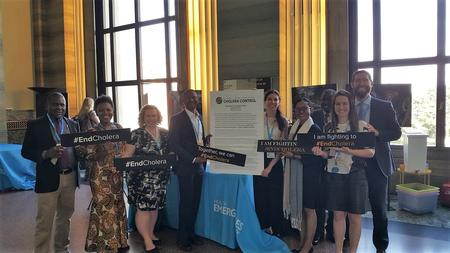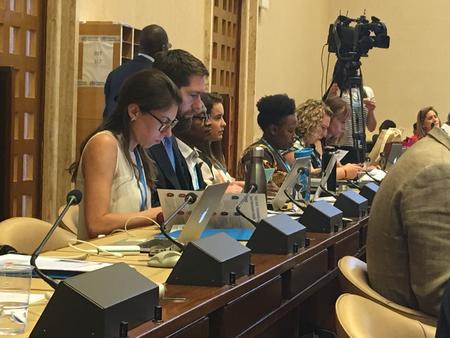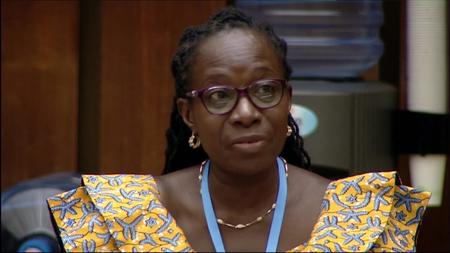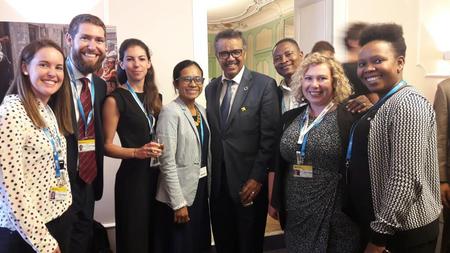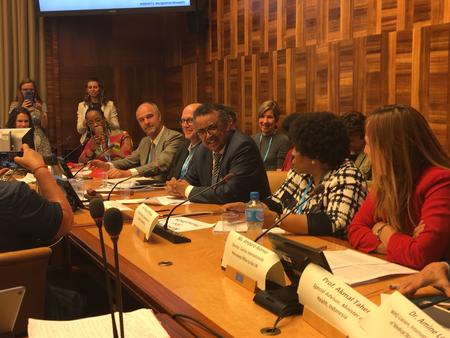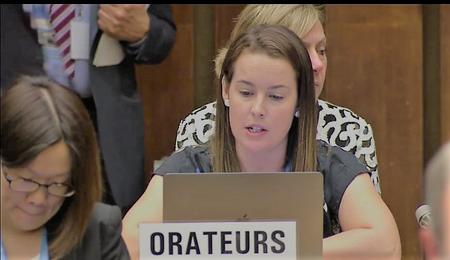Diary blog: WaterAid at the World Health Assembly

Following on from the success of the 71st World Health Assembly, WaterAid is at the 72nd World Health Assembly for 2019 advocating the importance of water, sanitation and hygiene to universal health coverage. Check out our 2019 blog for the latest news from Geneva.
We were at the 71st World Health Assembly from 21-25 May 2018. Recap on the highlights below.
24 May: A huge day for the fight against cholera: a new resolution has been passed!
By Sally Chen, Angie Chen and Megan Wilson-Jones
Day four started early (7.30am!) at an event on Infection Prevention and Control (IPC), which was kicked off with the acknowledgement that there can be no *quality* universal health coverage without water, sanitation and hygiene (WASH).
WaterAid Malawi's Head of Programmes Annie Msosa shared her experiences with attendees, and highlighted the unexpected challenge women face when they travel long distances to be seen, only to be disregarded by health workers and not listened to. Annie also noted that multiple sectors require investment (the health sector is highly financed, but WASH is not), but services need to be low cost and cheap to maintain so that local communities can sustain them in the long-term.
Meanwhile, WaterAid Cambodia's WASH and Health Program Manager Channa Sam Ol spoke at another side event co-organised by WaterAid on 'Women's health and hygiene in the SDG era', which focused on advocating menstrual hygiene management, women leadership and WASH in healthcare facilities. Channa shared her experience of promoting WASH through people-centred approaches, as well as strengthening female leadership in Cambodia by giving them more capacity and facilities in Cambodia.
There was cause for celebration during the afternoon as the WaterAid-backed resolution on cholera prevention and control was adopted! Proposed by the Governments of Zambia and Haiti, and co-sponsored by an additional eight countries, the resolution will *hopefully* signify a more coordinated response across government ministries and civil society in tackling and preventing the disease.
And to round off the day, Annie Msosa contributed to a technical briefing on health, environment and climate change with a salient bit of advice: "We need to go back to basics. We cannot and should not provide health care to sick people in an environment that is in itself detrimental to their health. This is a winnable battle that we can solve within our generation. We have the solutions, let’s make the resources available."
23 May: Investment, immunisation and the inclusion of water, sanitation and hygiene (WASH)
By Sally Chen and Angie Chen
We saw a lot of WaterAid presence on day three of the World Health Assembly, and it was very exciting to watch our colleagues contribute to discussions on investment, immunisation and the General Programme of Work (GPW: a plan drawn up every four years by the World Health Organisation (WHO) with the aim of improving global health governance).
Abdul-Nashiru Mohammed, WaterAid Ghana's Country Director, made a statement on the GWP for 2019–2023, urging member states to finance water, sanitation and hygiene as part of broader health systems investments.
At a side event on the business case for WHO immunisation activities in Africa, WaterAid's Helen Hamilton pointed out that the current business case doesn’t recognise the need to invest in cross-sector coordination and integration: "The point is not that funding for vaccines should go to WASH, but that we need funding for these elements on coordination and for them to be explicitly included, otherwise no one takes responsibility and it gets forgotten". Dr Richard Mihigo from The Immunization and Vaccine Development Programme responded, saying that the inclusion of WASH in immunisation programmes is indeed fundamental in tackling infectious diseases.
And to finish off a very productive day WaterAid attended the Global Task Force on Cholera Control evening event, which proved an ideal opportunity for our delegates to meet with WHO Director-General Dr. Tedros and discuss ambitious plans to reduce cholera by 90% by 2030. Watch WaterAid's Chief Executive Tim Wainwright explain more about WaterAid's role in ending cholera. Until tomorrow!
22 May: Climate change and civil society
By Angie Chen and Sally Chen
Day two of the World Health Assembly, and although WHO Director-General Dr. Tedros has been "jumping like a frog" from event to event (his words, not ours!), a key focus of his various speeches is 'partnerships'. To put it simply, if governments and international organisations don't forge partnerships with civil society and the private sector, we won’t achieve the Sustainable Development Goals or Universal Health Coverage.
There’s a definite sense that Dr. Tedros values the role of civil society in holding governments to account and galvanizing public pressure, and this was echoed by Dr. Agnes Binagwaho, Vice Chancellor of University of Global Health Equity. At a panel discussion we attended entitled 'One Health, One Planet', she told delegates that signing declarations is not in itself an action, and that accountability networks should be established to make "leadership neglect" a crime.
The discussion highlighted some sobering facts: environmental problems cause a quarter of disease burden which makes it a big concern in achieving one health; climate change is predicted to cause 250,000 deaths per year between now and 2050; neglected tropical diseases can be greatly influenced by climate change, such as vector borne diseases and emerging infectious diseases.
The solution is to implement global strategies that include joint investigation, social mobilization, and health security. Moreover, methodologies, tools, and capacities should be built to integrate and strengthen the linkage between environment and health.
It’s not just human health that's at stake – it's the health of the planet.
21 May 2018: Community health workers, common goals and cholera
By Sally Chen and Angie Chen
We've arrived in Geneva and already, during the first day of the conference, the challenge for this entire gathering has been established: our common goal is to promote Universal Health Coverage (UHC) not purely through planning, but through real action.
Evidence of 'real action' was given during a side event on the effectiveness of community health workers, where countries showcased their models of achieving primary healthcare. The main 'takeaway' from that event was delivered by the Minister of Health for Tanzania, who said that models cannot be copied and pasted, and should be a community-led solution and not a top-down prescription.
Meanwhile WaterAid's Health Advisor Alison Macintyre (author of our new report on health systems) read out a statement to delegates on the topic of Health, Environment and Climate Change. Alison highlighted the recent cholera outbreaks, and urged Member States and the World Health Organisation (WHO) to scale up action on the 'silent crisis' of inadequate water, sanitation and hygiene in healthcare facilities. Read the statement in full >
Today was also notable for the widespread praise of WHO Director-General Dr. Tedros. Under his leadership, WHO has shifted towards a more open relationship with civil societies and private sectors.
This shift will hopefully help address challenges faced in trying to achieve UHC, such as finance, securing resources, equity to access and the consequences of climate change.
